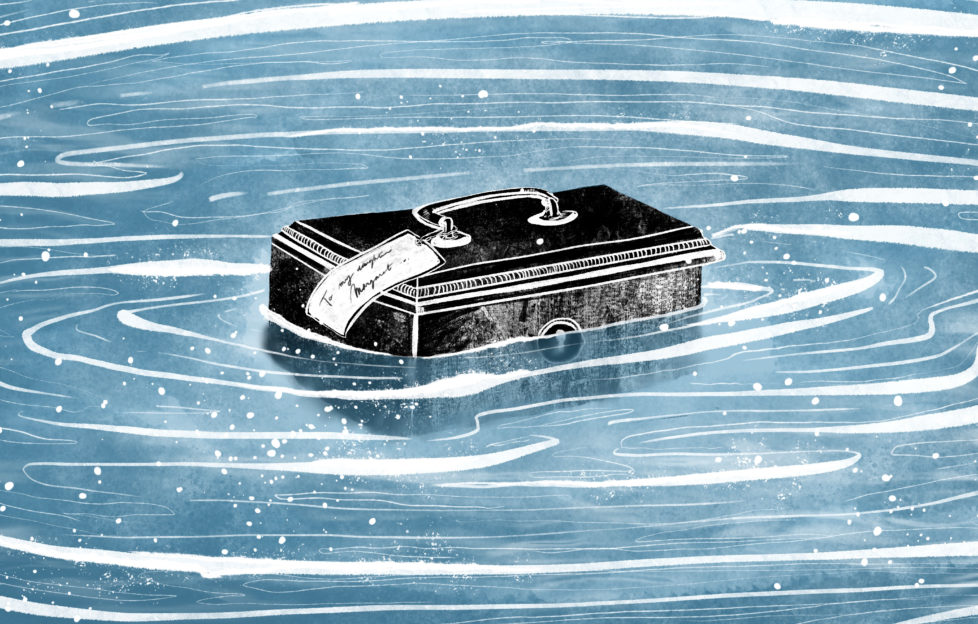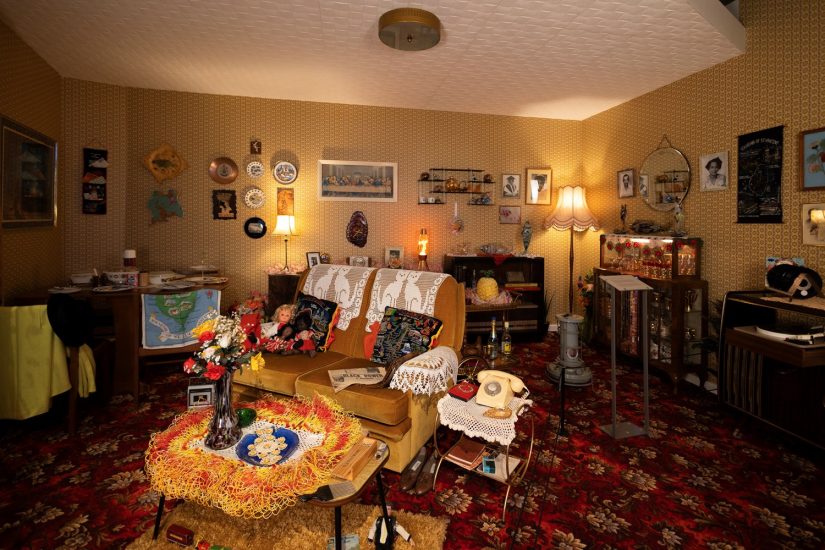“When The Tide Turned: A Story Of The Great Floods”

This is part one of “When The Tide Turned”, first published in “The People’s Friend” in 1914.
It was attributed to an author with the initials HL. Those readers who have listened to the first episode of “Reading Between The Lines”, our brand-new story podcast, will know that this usually meant the story was written by a “Friend” staff member.
Keep an eye out for the concluding part of this story, coming next week.
When dawn broke it revealed the presence of a group of anxious watchers on the shore.
Their eyes were turned sea-wards, and judging by the doleful countenances of the women-folk present, it was evident that the speculations of the sea-faring men and recognised weather prophets of the port were far from comforting.
All night long the south-west wind had raged furiously, driving before it great banks of seething foam, and although full tide was not due for several hours, high water-mark in the bay had already been reached; while the angry surf was beating with violence against the sea-wall throwing immense clouds of spray swirling skywards, enveloping the promenade in a drenching mist, and flinging itself with relentless fury upon the houses in the immediate vicinity of the beach.
But the impressive grandeur of the spectacle was completely lost upon the little knot of watchers, for the inhabitants of St Meddan’s had learned by bitter experience that unless the wind moderated to a considerable extent, or veered a point of two towards the west, the streets of their popular little resort would soon be engulfed in the waters of one of those devastating floods that had visited the town all too frequently of late, bringing disaster in its train.
Presently a bent and somewhat time-worn man detached himself from the group, and was soon in the toils of the gale. Buffeted by the fierce wind he sought to make his way towards the town.
“You may tell Marget to prepare for the worst, Peter,” was the cheerless counsel shouted after the retreating figure by big Harry, the pilot.
Accordingly, when Peter arrived at the tiny shop which bore above the portals the imposing sign: “St Meddan’s Provision Stores”, he wore the countenance of a man with whom Dame Fortune had been flirting outrageously.
Marget looked up as he entered. She was engaged in the task of removing to a place of greater safety some of the goods which littered the floor. Her face was clouded with anxiety, and her eyes expressed the question that her lips were loth to frame.
Peter met her gaze with a show of cheerfulness.
“Some folk are aye on the hunt for trouble,” he remarked, with a smile, and his eyes travelled meaningly in the direction of the goods which Marget had piled upon the counter out of harm’s way.
“I hope it’s needless work,” she replied shortly; “but I’ll be sair mistaken if it is. Eh, michty what a day!” she exclaimed, as a strong gust of wind caught the shop door and rattled it furiously.
“Faith, it’s a frisky breeze, Marget, an’ there’s a lot o’ watter in the Bay, fumin’ an’ lashin’ on the sea-wa’ like an angry lion in its cage.
“A gran’ sicht,” he added musingly, “but there’s naebody here to appreciate it. Folk are a’ too busy worryin’ aboot the uncertainties o’ life to pay much attention to the actual happenings.
“There’s auld McLintock, the grocer, preparin’ to throw oil on the troubled watters — that may never come — by plaisterin’ up the chinks o’ his door wi’ lumps o’ margarine; an’ Betty Johnston, o’ the delf shop, is working hersel’ into a towerin’ rage because she’s only jist found oot that somebody has used her stormboard for the election bonfire, an’ it’s too late noo to put in a claim against the Cooncil.
“That reminds me, too, that other folk are compleenin’ aboot losing their barricades, and to save bother,” he continued ingeniously, “it micht be as well for us to drop our stormboard into its socket noo,” saying which Peter deftly fixed the barricade into its appointed place in the doorway.
“Oh, Peter!” cried Marget, in a voice of nervous dread, as a suspicion of the true state of matters dawned upon her; “I believe you’ve been trying to cod me a’ the time.
“Don’t tell me the tide’s comin’ up,” she wailed. “If the watter breaks into the toon the day we’re ruined for life!”
“Tuts, woman,” returned Peter, soothingly, “it’s no sae bad as a’ that. We managed to keep things dry at the last big tide, and sae can we again, if need be.”
Take a look at Illustrations Ed Manon’s hard work on the fantastic picture accompanying our story:
“Oh, dear! Oh, dear!” moaned the poor woman, ignoring her husband’s efforts at consolation. “Little did I think when my mither left the shop in my care that I was to lose it like this.
“What wi’ bad weather when the simmer visitors were here, an’ the shipyard strike, no’ to mention the competition o’ the Big Store, profits ha’e dwindled awa’ to naething, ay, less than naething,” she wailed, “for had we no’ to borrow £50 to see us through this year.
“An noo to croon a’ comes a flood to swallow up oor bit stock,” and Marget clasped her hands convulsively in a gesture of despair.
What Peter intended to say in reply was never uttered, for at that moment a warning shout came from the street, and when the old man looked out of doors he beheld a huge wave rushing with the speed of a racehorse along the principal thoroughfare, and he knew that the tide had indeed come into the town.
Despite his aching limbs, Peter set to work with a will to remove as many of the goods as possible to a place of safety.
Throwing off her feelings of despair for a moment, his wide toiled with equal vigour to protect the stock.
Meanwhile the waters had risen rapidly in the street, and waves were now lapping steadily against the stormboard in the doorway.
So far, however, the tide had not found its way into the shop, and from present appearances it looked as though the combined exertions of husband and wife to keep it out would prove successful.
But, alas! In an unguarded moment, Peter sought to add to the day’s economies by removing a length of waxcloth from the floor. Unknown to him, the sea had been forcing its way through the outside ventilators of an adjoining property into the space between the floor and the foundations of the little store, and just as the old man was in the act of withdrawing the last of the nails which held the waxcloth in position, a loose board in the floor gave way as a result of the severe pressure from below, and with a rush the tide flowed into the shop.
Husband and wife realised at once the futility of trying to stem the invasion.
Soon the water had reached the level of the lower shelves, and began to play sad havoc with the perishable goods stored thereon.
With a cry of anguish Marget fled to the back premises, which were used by the old couple as sleeping quarters, and here Peter found her seated on the edge of the bed, out of reach of the flood.
“Oh, Peter, Peter!” she moaned, “what’s to come over us? There’s half o’ oor stock floatin’ aroon’ on the watter, an’ a lot is new stuff that’s no’ peyed for yet, an’ that can never be sell’t.
“I see naithing before us but the Puirhoose.”
“Tuts, tuts, woman,” remonstrated Peter, “there’s waur places than the Puirhoose the day, and this is ane o’them. The Puirhoose is at least watter-ticht. If it wasna, the puir folk wad soon refuse to stay in’t!”
“Oh, dear! Oh, dear!” groaned Marget, harking back to an old story. “Things micht ha’e been sae different had my mither leeved to tell me what was on her mind.
“‘The shop’s yours, Marget,’ she said to me on her death-bed. “Tak’ guid care o’t, lassie, an, if at any time you should happen to need siller—’ but that was a’ the length she got, puir body, for a spasm seized her and she slipped awa’ withoot feenishin’ what she intended to say.”
“Aye, aye, Marget,” the old man observed complaisantly, “that’s what comes o’ bringin’ up your parents on wrang lines.
“If your mither had been less grabby on the siller you wad ha’e been at hame to ken whaur she hoarded it instead o’ being oot at service.
“An’ if she had banked it like ither sensible folk, you micht ha’e been lookin’ aroon’ for a motor caur the day instead o’ a cushioned sate in the Puirhoose.”
“Michty me, Peter!” exclaimed Marget, peering eagerly beyond her husband, in the direction of the back window, “here comes Postie, splash-splashing through the watter like a hunted juck. What errand can he have here th’ day?”
To be continued . . .
Click here to read more of our fantastic Fiction content.
Click here to delve into our dramatic Daily Serial.










